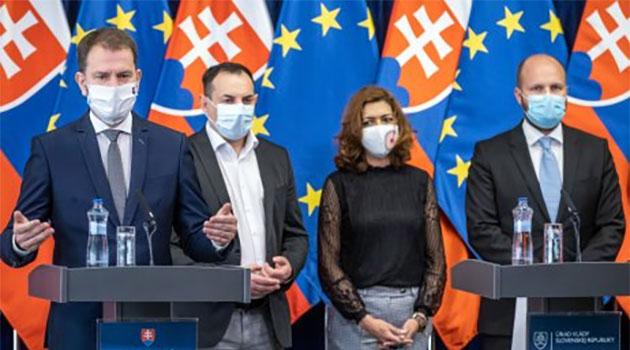Slovakia will test Romani settlement residents for COVID-19 and isolate infected people in state-run facilities

Starting this Friday around Slovakia, testing for COVID-19 will begin in 33 Romani settlements. Slovak PM Matovič announced the move at a press conference together with MEP Peter Pollák and the new Slovak Government Plenipotentiary for Romani Communities, Andrea Bučková, presenting his plan for combating the virus in excluded localities inhabited by Roma.
The sample testing, which will be supervised by soldiers, will happen from 3-9 April. On 10 April the results should be known.
“The fact that the Army will be going to the settlements is not a demonstration of force,” the PM said. Military doctors, according to him, will be aiding with the tests so as not to further burden civilian health care workers.
The PM said he wants to relocate any infected Romani residents of the settlements into state-run facilities. According to him, because of the low standards of hygiene in the Romani settlements, it is theoretically possible that one infected person could infect as many as 20 other people.
According to the PM, people whose homes are basically small huts, as they are in the settlements, will not do well remaining in such conditions as they attempt to self-isolate at home. “That’s not quarantine, but a threat to others,” he said.
For that reason, in his view, infected people from socially disadvantaging environments should be relocated into state-run facilities. There are about 1 000 excluded localities in Slovakia, and the Crisis Team is still finding out which have the biggest numbers of residents who may have recently returned from abroad.
According to MEP Pollák, an expert with the governing OĽaNO movement on issues involving Romani communities as well as a member of the Central Crisis Team, about 1 500 Romani people have returned to Slovakia from abroad without remaining in quarantine. He has called on municipalities to find housing capacity that can be used to isolate persons with COVID-19, but if that proves impossible, then those infected will be isolated in state-run facilities.
The MEP added that the number of communities in which testing will happen may expand in the future. During the first phase of testing, people who have returned from abroad will be sought in particular.
People who already show symptoms of infection will also be tested. The PM said he believes there will be enough tests available to cover the number of people from excluded communities expected to be tested.
The PM said testing will begin on Friday in the localities of Kecerovce, Jarovnice, Třebíč and Markušovce. That will be followed by testing in selected settlements of Fiľakovo, Šumiac, Bardejov, Cigeľka, Zborov, Kosihovce, Krížová Ves, Snina, Spišský Štiavnik, Batizovce, Strážske, Nacina Vec, Krompachy, Pavlovce nad Uhom, Žehra, Ondavské Matiašovce, Dobšiná, Vechec, Ochtiná, Bystrany, Slavošovce, Jakubany, Hrabušice, Bôrka, Doľany, Smižany and Čaklov.
Those who test positive for COVID-19 will then be isolated in state-run facilities. Pollák admitted that if a bigger number of people in a settlement turns out to be infected, the state will approach the situation by closing down the entire community.
“What awaits us is clearly something we don’t even know how to assess right now,” Pollák said. The armed forces have prepared a backup plan should big groups of infected persons be found in the settlements.
Slovak Defense Minister Jaroslav Naď confirmed that it is exactly the Defense Ministry that would be taking the initiative if such a scenario transpires. Bučková, who is the new Slovak Government Plenipotentiary for Romani Communities, emphasized the significance of informing people in the communities about what to expect.
“It is important that we familiarize them with this and persuade them about what the reasons are to undergo this testing and what the significance of the testing is for them,” she said. “We are communicating with them in the languages they speak, in other words, in Romanes or in Hungarian.”
